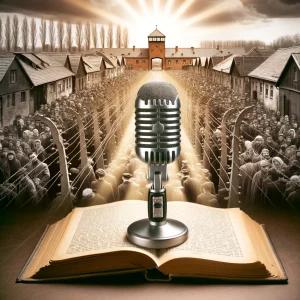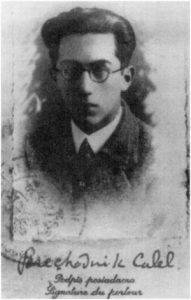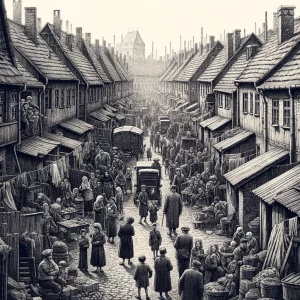Witness to Darkness: The Life of a Jewish Ghetto Policeman
 “I was a policeman in the ghetto, a Jewish policeman, but I wasn’t a Nazi collaborator. I did what I did to survive, to protect my family. But the guilt, it haunts me every single day.” – Calel Perechodnik
“I was a policeman in the ghetto, a Jewish policeman, but I wasn’t a Nazi collaborator. I did what I did to survive, to protect my family. But the guilt, it haunts me every single day.” – Calel Perechodnik
Calel Perechodnik’s story is a poignant and complex tale of survival, moral struggle, and the human capacity for both hope and despair. As a Jewish ghetto policeman in Otwock, Poland, Perechodnik found himself in an unimaginable position, balancing his duties under Nazi orders with his own humanity and the plight of his fellow Jews. This post explores his role, personal experiences, and the reactions of those in the ghettos to the growing knowledge of concentration camps. How did Calel cope with his role and the horrifying truths that emerged? His story offers profound insights into the depths of human resilience and the pursuit of kindness amidst despair.
Life in the Otwock Ghetto
The Otwock ghetto, established by the Nazis in 1940, was a microcosm of the brutal conditions faced by Jews during the Holocaust. Surrounded by barbed wire and armed guards, the ghetto was overcrowded and rife with disease, starvation, and fear. Daily life was a struggle for survival, with inhabitants forced into labour, deprived of basic needs, and living under the constant threat of deportation to concentration camps.
Daily Life and Struggles
In his writings, Calel Perechodnik vividly described the harsh realities of the Otwock ghetto.

By Unknown author – Am i a Murderer?: Testament of a Jewish Ghetto Policeman,, Public Domain, Link
He recounted the severe food shortages that left many on the brink of starvation. Bread was rationed, and families often resorted to trading their last valuables for a bit of sustenance. Sanitary conditions were abysmal, leading to frequent outbreaks of typhus and other diseases. The lack of medical supplies and the constant fear of illness added to the daily misery.
One poignant example from Perechodnik’s autobiography involves his description of the makeshift hospital in the ghetto. With few medical supplies and overcrowded conditions, the hospital was a place of suffering and death. Calel recounted how he saw people lying on the floors, their bodies ravaged by disease and malnutrition, with little hope of recovery. The scenes of despair and helplessness were a constant reminder of the ghetto’s dire conditions.
Roles and Responsibilities of Jewish Ghetto Police
Jewish ghetto policemen, like Calel Perechodnik, were tasked with maintaining order within these oppressive confines. Their duties included enforcing Nazi regulations, managing forced labour assignments, and sometimes facilitating deportations. These responsibilities placed them in a harrowing position, caught between their oppressors and their own community. While some viewed them as traitors or collaborators, others recognized the impossible choices they faced and their efforts to mitigate harm where possible.
Duties and Moral Dilemmas
 One of the most harrowing duties described by Perechodnik was the enforcement of labour quotas. He and his fellow policemen had to select individuals for forced labour assignments, knowing that refusal or resistance could result in severe punishment or death. Perechodnik wrote about the anguish of having to round up neighbours and friends, understanding that many would not return.
One of the most harrowing duties described by Perechodnik was the enforcement of labour quotas. He and his fellow policemen had to select individuals for forced labour assignments, knowing that refusal or resistance could result in severe punishment or death. Perechodnik wrote about the anguish of having to round up neighbours and friends, understanding that many would not return.
Another excruciating task was assisting in the deportations. During the major Aktion in August 1942, the Nazis ordered the liquidation of the Otwock ghetto, leading to the deportation of thousands to the Treblinka extermination camp. Perechodnik was forced to participate, witnessing the brutality inflicted on the deportees. In his autobiography, he recounted the heart-wrenching moment when he saw his own wife and daughter being herded into the trains. He felt utterly helpless, trapped by his role and unable to save them.
A Moment of Horror
Perechodnik’s account of the Aktion is particularly harrowing. He describes the chaotic scenes as families were torn apart, with mothers clutching their children, hoping to stay together, while soldiers and ghetto police herded them towards the trains. Calel’s own agony peaked when he recognized his wife, Anna, and their young daughter among the crowd. He tried desperately to save them, but his efforts were in vain. His description of this moment captures the depth of his despair and guilt: “I saw Anna. She looked at me with eyes that pleaded for help, eyes that questioned my very soul. But I could do nothing. I was powerless. In that moment, I felt my heart shatter.”
Personal Struggles
Calel Perechodnik was born in 1916 in Otwock, Poland. Before the war, he studied agronomy and had a promising future ahead of him. However, the Nazi invasion and subsequent persecution of Jews upended his life. In a desperate attempt to protect his family and navigate the increasingly dangerous environment, Perechodnik accepted a position as a ghetto policeman.
From the onset, Calel grappled with profound moral dilemmas. His autobiography, Am I a Murderer? Testament of a Jewish Ghetto Policeman, reveals his inner turmoil and guilt. He wrote, “I wanted to believe that by being a policeman, I could save my family. But every act, every decision, weighed heavily on my conscience.” Calel’s narrative provides a rare and raw insight into the psyche of a ghetto policeman, torn between survival and the deep sense of betrayal to his own people.
Did You Know
Calel Perechodnik’s writings are among the few surviving testimonies from Jewish ghetto policemen, offering a unique perspective on their roles and the immense psychological burden they carried.
Reactions
The spread of information about the concentration camps within the ghettos was slow and fraught with disbelief. Initially, many could not fathom the extent of the atrocities being committed. As eyewitness accounts and escapee testimonies began to filter in, the horrifying reality started to sink in. This knowledge profoundly affected the ghettos, causing fear, panic, and a desperate search for means of escape or resistance.
For ghetto policemen like Perechodnik, this knowledge added another layer of torment. In his writings, Calel described his reaction upon learning about the mass exterminations: “When the truth about Treblinka reached us, it felt like the ground had been ripped from under my feet. The realisation that we were all marked for death was a crushing blow.” Despite the overwhelming despair, there were also acts of defiance and solidarity, as individuals and groups within the ghettos sought ways to resist or save others, even in the face of near-certain death.
Calel Perechodnik’s journey is a stark reminder of the complexities of human choices under extreme duress. His story is not just one of guilt and survival, but also of the relentless pursuit of hope and kindness in the darkest of times. As historian Raul Hilberg once noted, “The Holocaust forced people to make unimaginable choices. In Calel’s story, we see a man caught in the web of history, trying to navigate his way with whatever humanity he could muster.”
Find Out More!
- Book: Calel Perechodnik: Am I a Murderer? Testament of a Jewish Ghetto Policeman
- Website: United States Holocaust Memorial Museum – Comprehensive resources on Jewish ghetto police and Holocaust testimonies.
0 Comments